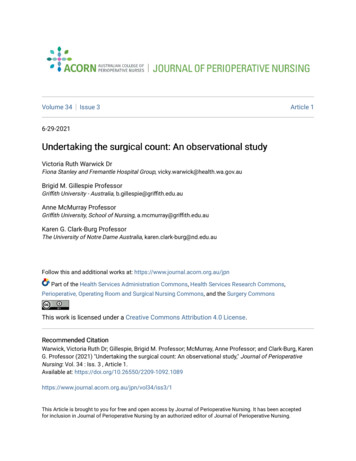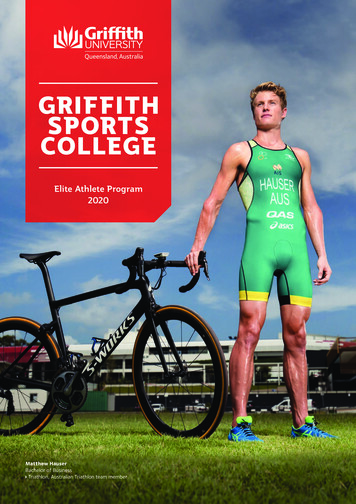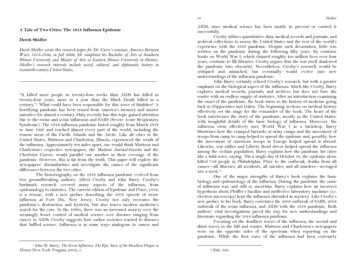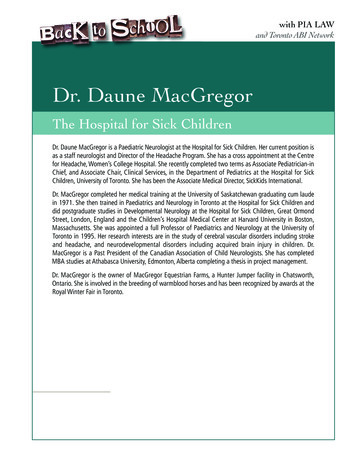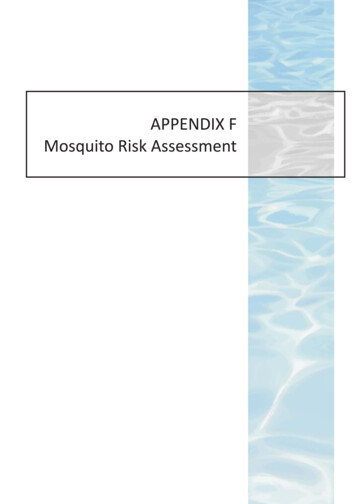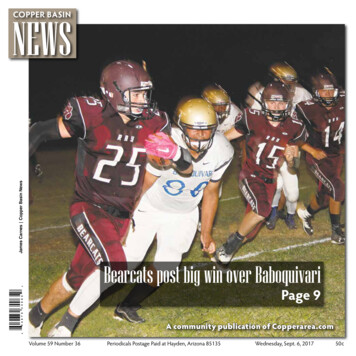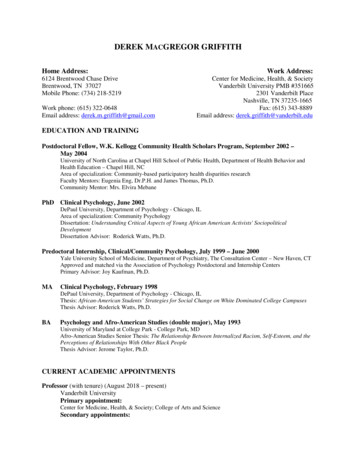
Transcription
DEREK MACGREGOR GRIFFITHHome Address:6124 Brentwood Chase DriveBrentwood, TN 37027Mobile Phone: (734) 218-5219Work phone: (615) 322-0648Email address: derek.m.griffith@gmail.comWork Address:Center for Medicine, Health, & SocietyVanderbilt University PMB #3516652301 Vanderbilt PlaceNashville, TN 37235-1665Fax: (615) 343-8889Email address: derek.griffith@vanderbilt.eduEDUCATION AND TRAININGPostdoctoral Fellow, W.K. Kellogg Community Health Scholars Program, September 2002 –May 2004University of North Carolina at Chapel Hill School of Public Health, Department of Health Behavior andHealth Education – Chapel Hill, NCArea of specialization: Community-based participatory health disparities researchFaculty Mentors: Eugenia Eng, Dr.P.H. and James Thomas, Ph.D.Community Mentor: Mrs. Elvira MebanePhD Clinical Psychology, June 2002DePaul University, Department of Psychology - Chicago, ILArea of specialization: Community PsychologyDissertation: Understanding Critical Aspects of Young African American Activists' SociopoliticalDevelopmentDissertation Advisor: Roderick Watts, Ph.D.Predoctoral Internship, Clinical/Community Psychology, July 1999 – June 2000Yale University School of Medicine, Department of Psychiatry, The Consultation Center – New Haven, CTApproved and matched via the Association of Psychology Postdoctoral and Internship CentersPrimary Advisor: Joy Kaufman, Ph.D.MAClinical Psychology, February 1998DePaul University, Department of Psychology - Chicago, ILThesis: African-American Students’ Strategies for Social Change on White Dominated College CampusesThesis Advisor: Roderick Watts, Ph.D.BAPsychology and Afro-American Studies (double major), May 1993University of Maryland at College Park - College Park, MDAfro-American Studies Senior Thesis: The Relationship Between Internalized Racism, Self-Esteem, and thePerceptions of Relationships With Other Black PeopleThesis Advisor: Jerome Taylor, Ph.D.CURRENT ACADEMIC APPOINTMENTSProfessor (with tenure) (August 2018 – present)Vanderbilt UniversityPrimary appointment:Center for Medicine, Health, & Society; College of Arts and ScienceSecondary appointments:
D.M. Griffith, page 2Division of General Internal Medicine and Public Health, School of MedicineDepartment of Health Policy, School of MedicineDepartment of Sociology, College of Arts and ScienceProgram in American Studies, College of Arts and ScienceFounder and Director (May 2016 – present)Center for Research on Men’s Health, Office of the Vice Provost for Research, Vanderbilt University.Faculty Member (November 2012 – present)Vanderbilt-Ingram Cancer Center, Cancer Health Outcomes and Control Research Program.Funded by the National Cancer Institute. Cancer Center Director: Jennifer Pietenpol, Ph.D.; ProgramDirectors: David F. Penson, M.D., M.P.H. and Debra Friedman, M.D.Scholar (December 2013 – present)Vanderbilt Center for Health Services Research. Institute for Medicine and Public Health,Vanderbilt University Medical Center. Director: Russell Rothman, M.D., M.P.P.PREVIOUS ACADEMIC APPOINTMENTSAssociate Professor (with tenure) (July 2012 – July 2018)Vanderbilt UniversityPrimary appointment:Center for Medicine, Health, & Society; College of Arts and ScienceSecondary appointments:Division of General Internal Medicine and Public Health, School of MedicineDepartment of Health Policy, School of MedicineDepartment of Sociology, College of Arts and ScienceProgram in American Studies, College of Arts and ScienceCore Faculty Member (July 2012 – September 2017)Vanderbilt Institute for Clinical and Translational Research, Meharry-Vanderbilt CommunityEngaged Research Core. Funded by the National Center for Research Resources of the NationalInstitutes of Health. Program Directors: Russell Rothman, M.D., M.P.P., Margaret Hargreaves, Ph.D. andVelma Mc-Bride Murry, Ph.D.Founder and Director (July 2012 – April 2016)Institute for Research on Men’s Health, Center for Medicine, Health & Society, College of Arts andScience, Vanderbilt University.Assistant Professor (tenure-track) (September 2007 – June 2012)University of MichiganPrimary appointment:Department of Health Behavior and Health Education, School of Public Health.Founder and Director (November 2009 – June 2012)Center on Men’s Health Disparities (CMHD), University of Michigan School of Public Health.Assistant Director for Research and Research Training (October 2005 – June 2012)Center for Research on Ethnicity, Culture and Health (CRECH), University of Michigan Schoolof Public Health. Funded by the National Institute of General Medical Sciences of the National Institutesof Health. CRECH Director is Cleopatra Caldwell, Ph.D.
D.M. Griffith, page 3Core Faculty Member (April 2011 – June 2012)University of Michigan Comprehensive Cancer Center, Socio-Behavioral Research Program.Funded by the National Cancer Institute. Program Directors: Laurel Northouse, Ph.D. and Steven Katz,M.D.Assistant Research Scientist (Non tenure-track) (June 2004 – August 2007)University of MichiganPrimary appointment:Department of Health Behavior and Health Education, School of Public Health.Associate Director of Evaluation (June 2004 – September 2009)Prevention Research Center of Michigan (PRC), University of Michigan School of PublicHealth. Funded by the U.S. Centers for Disease Control and Prevention. Funded by the U.S. Centers forDisease Control and Prevention. Principal Investigator of the PRC is Marc Zimmerman, Ph.D.Core Faculty Member (September 2007 – October 2009)Michigan Institute for Clinical and Health Research (MICHR), Community Engagement Coreand Health Disparities Research Program, University of Michigan. Funded by the National Institutesof Health. Principal Investigator of MICHR was Daniel Clauw, M.D.; Principal Investigator of theCommunity Engagement Core is Carolyn Sampselle, Ph.D.; and Principal Investigator of the HealthDisparities Research Program was Carmen Green, M.D.OTHER POSITIONSHealth Policy Associate (2012-2014). Robert Wood Johnson Foundation Center for Health Policy atMeharry Medical College. Nashville, TN.Research Associate. (2003-2005). Greensboro Initiative on the Institutional Dimensions of Racial andEthnic Disparities in Health Care. Funded by the Moses Cone Wesley Long Foundation.Grantee was Nettie Coad.Research Associate. (2002-2003). Evidence-Based Review of Community-Based ParticipatoryResearch, University of North Carolina at Chapel Hill, Sheps Center for Health Services Researchand Research Triangle Institute, Inc., August 2002 - December 2003. Funded by the U.S. Agencyfor Healthcare Quality and Research. Co-Scientific Directors were Eugenia Eng, Dr.P.H., andAlice Ammerman, Dr.P.H., and the Project Director was Meera Viswanathan, Ph.D.Research Associate. (2002-2003). Impact of Organizational Networks on HIV/AIDS Prevalence,University of North Carolina at Chapel Hill, School of Public Health, Department ofEpidemiology. Funded by the U.S. Agency for Healthcare Quality and Research. PrincipalInvestigator was James Thomas, Ph.D.Director. (2002). Forging AIDS Initiatives To Help (FAITH) Communities: Saint Thomas EpiscopalChurch, Chicago, IL. Funded by the Illinois Department of Commerce and Community Affairs.Grantee was Rev. Fr. Martini Shaw.Project Director. (2000-2002). Community Intervention Trial for Youth (CITY Project) - ChicagoSite, University of Illinois at Chicago, Department of Psychology. Funded by the U.S. Centers forDisease Control and Prevention. Principal Investigator was Robin Lin Miller, Ph.D.
D.M. Griffith, page 4Research Associate/ Predoctoral Intern. (1999-2000). Yale University, School of Medicine,Department of Psychiatry, The Consultation Center.New London After-School Self-Assessment: Supervisors were Matthew Chinman, Ph.D. andTerry Freeman, L.C.S.W.Getting It Together: Supervisors were Bret Kloos, Ph.D. and Susan Zimmerman, M.A.Positive Youth Development Program: Supervisor was Jane Shepard, Psy.D.Youth Development Training and Resource Center (YDTRC): Supervisors were DeborahStewart, B.A. and Terry Freeman, L.C.S.W.Research Assistant. (1994-1999). Young Warriors: A Program for Young, African-American Men,DePaul University, Department of Psychology. Funded in part by the Center for Black Diasporaat DePaul University and the Center for Urban Education at DePaul University. Co-PrincipalInvestigators were Roderick Watts, Ph.D. and Jaleel Abdul-Adil, Ph.D.Research Analyst and Team Coordinator. (1998-1999). Positive Attitudes for Learning in School(PALS) Program, University of Illinois at Chicago, Department of Psychiatry, Institute forJuvenile Research. Funded by the National Institute of Mental Health. Principal Investigator wasMarc Atkins, Ph.D.Research Associate. (1997-1998). 3-D (Data Driven Decisions) Group. Funded by the AnnenbergFoundation. Supervisor/Senior Research Consultant was Dale Rose, Ph.D.TEACHING EXPERIENCEMHS-180-01/ 1940 (Racial and Ethnic Health Disparities), Vanderbilt University Center for Medicine,Health and Society (Fall 2013-present). (MHS 290-15: Race, Ethnicity and Health, Spring 2013).Relationship between health outcomes and race and ethnicity. Historical and contemporary factors influencingdifferences in health outcomes, including mental health, HIV/AIDS, and other chronic diseases. Explanations ofhealth disparities and of strategies to reduce them.MHS 234-01/ 2330 (Men’s Health Research/ Men’s Health Research and Policy), VanderbiltUniversity Center for Medicine, Health and Society (Spring 2014-present). (MHS 290-14: Research onMen’s Health, Spring 2013). Examines why men’s social and economic advantages do not translate to betterhealth outcomes. We will explore global and domestic issues in men’s health, particularly in Australia, Canada, theUnited Kingdom and the United States. By the end of the course, students will be able to articulate key concepts andtheories that explain men’s health, differentiate strategies to improve men’s health, understand relationships betweencultural values and health policy and describe how cultural explanations for men’s health outcomes shapeadvertising around various men’s health services and campaigns. This course is open to all who are interested inunderstanding how to begin systematically thinking about and addressing men’s health and men’s health disparities.HBHE 622 (Program Evaluation in Health Education), University of Michigan, School of PublicHealth, Department of Health Behavior and Health Education (Fall 2009-Winter 2012). The primaryobjective of this one-semester, three-credit course is to provide a forum for preparing students to examine themethods public health professional use to determine whether and how a program “works”. The course coversfundamentals of study design, the framing of evaluation questions, basic quantitative and qualitative data analysistechniques for assessing program processes and outcomes.HBHE 613 (Men's Health/ Men’s Health Disparities), University of Michigan, School of PublicHealth, Department of Health Behavior and Health Education (Fall 2008-Winter 2012). Men’s healthdisparities is an emerging area of research that examines how the gendered nature of society differentially influencesmen’s health. The field of men’s health includes the investigation of: (1) conditions that are unique to men, (2)
D.M. Griffith, page 5diseases or illnesses that are more prevalent in men, (3) health problems for which risk factors are different in men,and (4) health issues for which different interventions are required for men. While gender has been identified as acritical factor in women’s health, the social and cultural construction of gender and its implications have notgarnered as much attention in men’s health.HBHE 632 (Racial/ Ethnic Health Disparities Research & Interventions), University of Michigan,School of Public Health, Department of Health Behavior and Health Education (Winter 2008-Winter2012). I am teaching this interdisciplinary master's-level course that will help to prepare students to develop andimplement interventions to address racial and ethnic health disparities. The course provides students with afundamental working knowledge of key concepts and terms, historical events, and contemporary topics relevant toproviding a broad and comprehensive foundation for examining scientific literature and conducting basic andintervention research on racial and ethnic health disparities.HBHE 702 (Reducing Racial/ Ethnic Health Disparities), University of Michigan, School of PublicHealth, Department of Health Behavior and Health Education (Fall 2005-Winter 2007). I taught (05-06)and co-taught (with Harold Neighbors, Ph.D.) (06-07) this interdisciplinary doctoral seminar that focuses on theconcept of population health and health disparities between racial/ethnic groups within the United States. Itemphasizes social and historical factors that influence the health of populations and their contributions to racial orethnic health disparities, and examines strategies for intervening to reduce racial/ethnic disparities in health.HBHE 242 (Health Education Field Practicum), University of North Carolina at Chapel Hill, School ofPublic Health, Department of Health Behavior and Health Education (May 2003 – December 2003). Cotaught (with Eugenia Eng, Dr.P.H.) an individualized, health education field-based course on community-basedparticipatory research and evaluation.HBHE 240 (Foundations of Health Education Practice) and HBHE 241 (Action-OrientedCommunity Diagnosis), University of North Carolina at Chapel Hill, School of Public Health,Department of Health Behavior and Health Education (September 2002 - June 2003). Co-taught (withEugenia Eng, Dr.P.H. and Karen Moore, M.P.H.) a required masters-level course on community-based participatoryassessment and evaluation, using methods from anthropology and epidemiology to help public health educators plancommunity-based practice and research. We trained and mentored students working in teams with university andcommunity preceptors to conduct qualitative interviews and focus groups and to present the data back to thecommunity in a community forum.GRANT SUPPORT (Principal Investigator, Co-Investigator & Consultant)ACTIVECo-Principal Investigator. (2018-2020). Engendering Trust in Health Care: Incorporating gender, ageand race in efforts to measure and increase trust among African American men. Robert WoodJohnson Foundation (The Building Trust and Mutual Respect in Health Care solicitation ismanaged by AcademyHealth). (Co-PI: Consuelo H. Wilkins, MD, MCSI and Derek M. Griffith,PhD) Award amount: 249,957.Principal Investigator. (2016-2019). Mighty Men: A Faith-Based Weight Loss Program to ReduceCancer Disparities. Research Scholar Grant in Cancer Control and Prevention Funded by theAmerican Cancer Society. Award amount: 1,600,000.Co-Investigator/ Sub-Project Principal Investigator/ Member of Consortium Core. (2016-2021).Center of Excellence in Precision Medicine and Population Health proposal in response toNIMHD Transdisciplinary Collaborative Centers for Health Disparities Research Focused onPrecision Medicine (U54). (Multiple PIs: Consuelo Wilkins, MD, MCSI, Nancy J. Cox, PhD,
D.M. Griffith, page 6Maria F. Lima, PhD and Roy E. Weiss, MD, PhD). Award amount: 9,452,962.Principal Investigator (Project 3) of the NIMHD U54 (Center of Excellence in PrecisionMedicine and Population Health) (2017-2021): Tailored behavioral intervention for overweightAfrican American and Latino men. Award amount: 1,188,677.Co-Investigator. (2017-2019). Trust and Privacy in underrepresented groups. Minority Supplementfunded by the National Center for Advancing Translational Sciences, National Institutes ofHealth. (PI: Consuelo Wilkins, MD, MCSI). Award amount: 8,434.COMPLETED – Principal Investigator or Co-InvestigatorCo-Investigator (2016-2018). Mobile Phone Intervention for Physical Activity Maintenance in AfricanAmerican Men (MobileMen). R41 funded by the National Institute on Minority Health andHealth Disparities. (PI: Robert Newton, PhD) Award amount: 224,998.Co-Investigator (2014-2018). Active and Healthy Brotherhood. Funded by the Patient-CenteredOutcomes Research Institute. (PI: Melicia Whitt-Glover, PhD) Award amount: 2,075,511.Co-Investigator (2014-2018). Obesity Health Disparities PRIDE. R25 Funded by the National Heart,Lung, and Blood Institute, National Institutes of Health. (PI: Bettina Beech, PhD) Awardamount: 287,570 (annual).Principal Investigator. (2015-2017). Using Tailoring and Technology to Promote Health Equity inAfrican American Men. Aetna Foundation. Award amount: 89,806.Co-Investigator (2012-2017). The Vanderbilt Institute for Clinical and Translational Research (VICTR).UL1 funded by the National Center for Advancing Translational Sciences, NationalInstitutes of Health. (PI: Gordon Bernard, MD) Award amount: 6,986,576 (annual).Co-Investigator (2014-2015). Connected Communities: A Strengths-Based Research Program for HealthEquity & Health Promotion Among African/Caribbean/Black Men in Canada. Funded by theCanadian Institutes of Health Research. (PI: Lance McCready, PhD). Award amount: 10,000.Principal Investigator. (2012-2015). Tailoring Healthy Eating and Physical Activity for AfricanAmerican Men. R21 funded by the National Institute of Diabetes and Digestive and KidneyDiseases, National Institutes of Health. Award amount: 422,175.Co-Investigator (2012-2015). University of Guyana-Vanderbilt-UCSF MPH Program for Guyana.Funded by the US Centers for Disease Control and Prevention. (PI: Douglas C. Heimburger,MD, MS). Award amount: 361,694 (annual).Principal Investigator. (2012-2014). Faculty Development Support Grant (Psychometric survey of therelationship between masculinity, eating and physical activity in Black, Latino and White men;and Men on the Move Nashville: Pilot Physical Activity Study for Middle-aged and Older AfricanAmerican Men). Funded by the Vanderbilt-Ingram Cancer Center. Award amount: 70,000.Principal Investigator. (2013-2014). Social Determinants of Obesogenic Behaviors of Middle-agedAfrican American Men. Pilot mini-grant funded by the Robert Wood Johnson FoundationCenter for Health Policy at Meharry Medical College. Award amount: 20,000.
D.M. Griffith, page 7Co-Investigator. (2010-2014). Promising Practices for Reducing Racial Disparities in Infant Mortalityin Michigan- A Pilot Study. Funded by the W. K Kellogg Foundation. (PI: Alethia Carr, RD,MBA (retired) then Sheryl Weir, MPH). Award amount: 1,336,356.Co-Investigator. (2010-2012). Comparative Effectiveness Research to Reduce Racial Disparities inCardiovascular Disease. Funded by the National Institute on Minority Health and HealthDisparities, National Institutes of Health. (Multiple PIs: Amy Schulz, PhD and Ana Diez-Roux,MD, PhD) Award amount: 1,396,894.Principal Investigator. (2007-2012). Building Capacity to Reduce African American Men’s DietaryCancer Risk. Mentored Research Scholar Grant in Cancer Control and Prevention funded bythe American Cancer Society. Award amount: 728,000.Co-Investigator. (2009-2013). Promoting Ethnic Diversity in Public Health Training. Funded by theNational Institute of General Medical Sciences, National Institutes of Health. (PI: Harold W.Neighbors, PhD) Award amount: 2,018,095.Principal Investigator. (2003-2005; 2006-2007; 2007-2009; 2009-2011). Health Disparities ResearchLoan Repayment Program. Funded by the National Center on Minority Health and HealthDisparities, National Institutes of Health. 42,580 (03-05); 23,222 (06-07); 19,889 (07-09); 6,981; (09-11); 7,030.Principal Investigator. (2011). Spring/ Summer Research Grants Program. Funded by the Universityof Michigan Rackham Graduate School. Award amount: 6,000.Principal Investigator. (2010-2012). African American Masculinities & Chronic Illness. Funded bythe University of Michigan Institute for Research on Women & Gender. Award amount: 10,000.Principal Investigator. (2009-2010). Men on the Move: A pilot program to increase physical activityamong urban, African American men. Funded by the University of Michigan ComprehensiveCancer Center. Award amount: 30,000.Principal Investigator. (2009-2010). Exploring factors associated with diet and physical activityamong older, African American men. Funded by the Michigan Center for Urban AfricanAmerican Aging Research. Award amount: 20,000.Principal Investigator. (2009-2010). Implications of self-determination theory for healthy eating andphysical activity among urban, African American men. Funded by the University of MichiganComprehensive Cancer Center. Award amount: 30,000.Co-Investigator. (2009-2010). Capacity Building to Reduce Health Disparities. Funded by the ArkusFoundation. (PI: Harold W. Neighbors, PhD) Award amount: 150,000.Co-Investigator. (2007-2009). Michigan Institute for Clinical and Health Research: Health DisparitiesResearch Program ('07-'09) and the Community Engagement Research Program ('07-'08). Fundedby the National Institutes of Health, Clinical and Translational Science Award. (PI: KenPienta, MD). Award amount: 55,000,000.Principal Investigator. (2004-2009). Community Capacity Building to Reduce Health Disparities.
D.M. Griffith, page 8Core Project of the Prevention Research Center of Michigan. Funded by U.S. Centers forDisease Control and Prevention (Center PI: Marc Zimmerman, PhD) Award amount: 4,376,557.Co-Investigator and Co-Program Director. (2004-2008). Promoting Ethnic Diversity inPublic Health. Funded by the National Institute of General Medical Sciences Initiative forMaximizing Student Diversity, National Institutes of Health. (PI: Harold W. Neighbors, PhD)Award amount: 2,473,202.Principal Investigator. (2006). Eliminating Racial and Ethnic Health Disparities: The Intersection ofProfessional Development and Professional Practice. Funded by The National Center forInstitutional Diversity. Award amount: 13,474.Co-Investigator. (2004-2006). Flint Youth Violence Prevention Center. Project of the PreventionResearch Center of Michigan. Funded by U.S. Centers for Disease Control and Prevention(Center PI: Marc Zimmerman, PhD) Award amount: 1,715,209.Co-Investigator. (2004-2006). Men As Navigators for Health. University of North Carolina Centerfor Disease Prevention and Health Promotion. Funded by U.S. Centers for Disease Controland Prevention (PI: Eugenia Eng, DrPH) Award amount: 753,311.Principal Investigator. (2002-2004). Men Acting Together on Cancer and Health (MATCH) Project.Funded by the W.K. Kellogg Community Health Scholars Program. Award amount: 20,000.Co-Investigator. (2002). Forging AIDS Initiatives To Help (FAITH) Communities. Funded by theIllinois Department of Commerce and Community Affairs. Award amount: 100,000.COMPLETED – ConsultantConsultant. (2016-2018). Creating a Tailored Lifestyle Intervention for Midlife Mexican AmericanMen. R21 funded by the National Institute of Aging, National Institutes of Health. (PI: StevenHooker, PhD, FACSM, FNAK) Award amount: 424,875.Consultant. (2013). Stress, Age, and Cardiovascular Health Promotion among African AmericanMen. Pilot grant funded by the University of Mississippi Medical Center. Grantee was Marino A.Bruce PhD, MSRC, CRC.Consultant. (2012-2013). Masculinity, Race, and the Politics of American Men’s Health Policy.Funded by the Robert Wood Johnson Foundation Center for Health Policy at Meharry MedicalCollege, Pilot Project Mini-Grant Program.Evaluation Consultant. (2006-2007; 2008-2009; 2010; 2010-2011; 2012-2013). YOUR BlessedHealth: HIV/AIDS Prevention & Outreach through Flint Pastors' Wives. Funded by the RuthMott Foundation. Grantee was Bettina Campbell, MSW.Community Based Participatory Research Consultant. (2006-2008). Choose to Live Initiative. TheCenter for Closing the Health Gap in Greater Cincinnati, Cincinnati, Ohio. Funded by the HealthFoundation of Greater Cincinnati. Grantee was Dwight Tillery.Evaluation Consultant. (2002-2004). Dismantling Racism Process. Chatham, N.C. County Public
D.M. Griffith, page 9Health Department and the University of North Carolina’s Department of Health Behavior andHealth Education. Funded in part by the Z. Smith Reynolds Foundation. Lead Staff Member wasVanessa Jeffries, M.Ed.EDITORIAL ACTIVITIESEditorial Board (2018-present); Associate Editor (2013-2018): Health Education & Behavior.Editorial Board (2018-present): International Journal of Men’s Social and Community Health.Associate Editor (2017-2019); Editorial Board (2016): Ethnicity & Disease.Editorial Advisory Board – Racial and Ethnic Diversity and Disparity Issues (2017-2019): AmericanJournal of Men’s Health.Guest Editor (2018): Family and Community Health Issue on “Diversity in Health Disparitiesand Health Equity Research in Family and Community Health” (Co-Edited with Drs. MarinoBruce and Roland Thorpe). Volume 41, Issue #4 (October – December 2018 Issue).Guest Editor (2017): Journal of Clinical Psychology in Medical Settings Special Issue on HealthDisparities & Diversity” (Co-Edited with Dr. Alfiee M. Breland-Noble). Volume 24, Issue #3-4.Lead Guest Editor (2017): Health Education & Behavior Special Issue on “Advancing QualitativeResearch to Promote Health Equity” (Co-Edited with Drs. Rachel C. Shelton & Michelle C.Kegler). Volume 44, Issue #5 (October 2017 issue).Associate Editor (2012-2015): Progress in Community Health Partnerships: Research, Education, &Action.Guest Editor (2015): Family and Community Health Special Issue on “Social Determinants of Men’sHealth Disparities” (Co-Edited with Drs. Marino Bruce and Roland Thorpe). Volume 38, Issue #4(October – December 2015 Issue).Guest Editor (2013): International Journal of Men’s Health Special Issue on “Practical Solutions toAddress Men’s Health Disparities” (Co-Edited with Dr. Daphne Watkins). Volume 12, Issue #3(Fall 2013 Issue).Guest Editor (2013): American Journal of Men’s Health Special Supplement on “The Health ofAfrican American Men: Implications for Research and Practice” (Co-Edited with Dr. LeonardJack). Volume 7, Issue #4 (Supplement to the July 2013 Issue).SCIENTIFIC REVIEW ACTIVITIESStanding Review Committee Member (2016–2019). American Cancer Society, Peer Review Committeefor Cancer Control and Prevention: Psychosocial and Behavioral Research (CPPB) grantapplications.Review Committee Member (2018). National Institutes of Health, National Heart, Lung, and Blood
D.M. Griffith, page 10Institute, Office of Scientific Review Special Emphasis Panel to review CONTRACTsolicitations for “Hispanic Community Health Study / Study of Latinos (HCHS / SOL) FieldCenters (Ad-hoc committee).Panelist (2018). Ford Foundation Fellowship Program, Social Science and Humanities Review Panel(Sociology) (predoctoral, dissertation, and postdoctoral levels). National Academies of Sciences,Engineering and Medicine. Irvine, CA.Ad-hoc Reviewer (2017). Center for Diabetes Translation Research, Vanderbilt University MedicalCenter Pilot and Feasibility Grant Program.Review Committee Member (2017). National Institutes of Health, Center for Scientific Review, ZRG1PSE-V 56 Population-Level Cancer Control Strategies (Ad-hoc committee).Expert Review Panel and Lead of Demographics Subgroup (2015-2016). RTI International/ NationalInstitutes of Health, National Human Genome Research Institute, PhenX (consensus measures forPhenotypes and eXposures) Toolkit Working Group on Demographics, Environmental Exposuresand the Social Environment.Review Committee Member (2015). National Institutes of Health, Center for Scientific Review, HealthDisparities and Equity Promotion Study Section (HDEP). (Ad-hoc committee)Review Committee Member (2012). NIH, National Cancer Institute, RFA-CA-11-012, “ResearchAnswers to NCI’s Provocative Questions” (R21). (Ad-hoc committee)Review Committee Member (2009). NIH, National Cancer Institute, PAR-09-003, Small Grants forBehavioral Research in Cancer Control (R03). (Ad-hoc committee)Review Committee Member (2009 & 2010). NIH, National Cancer Institute, RFA-CA-09-501,Comprehensive Minority Institution/Cancer Center Partnership (U54). (Ad-hoc committee)Review Committee Member (2007 & 2008). Centers for Disease Control and Prevention (CDC)PAR07-231, "CDC Grants for Public Health Dissertation Research (R36)". (Ad-hoc committee)External Consultation on Social Determinants of Health. (2008-2009). U.S. Centers for DiseaseControl and Prevention, National Center for HIV/AIDS, Viral Hepatitis, STD and TBPrevention.Review Committee Member (2008). Michigan Institute for Clinical and Health Research CommunityEngagement Core Grant Proposals. (Ad-hoc committee)Scientific Evaluation Group Member (2007-2010). AHRQ/ NCI Advancing Research Methodologyfor Measuring and Monitoring Patient-Centered Communication in Cancer Care.Conference Presentation Abstract Reviewer (2003-2007, 2009, 2010, 2012): American Public HealthAssociation, Community-based Public Health Caucus Conference Presentation Abstracts.Ad-hoc Reviewer: American Journal of Men’s Health American Journal of Public Health American Journal of Sexuality Education Annals of Epidemiology
D.M. Griffith, page 11 Behavioral MedicineBMC Public HealthFamily and Community HealthHealth Education & BehaviorHealth Promotion PracticeInternational Journal of Men’s Social andCommunity Health Journal of Health Disparities Researchand Practice Journal of Immigrant and Minority Health Medical Anthropology Progress in Community HealthPartnerships: Research, Education, &Action Qualitative Health Research Social Science and Medicine Violence and VictimsHONORS AND AWARDSFellow of the American Academy of Health Behavior (2018). American Academy of Health Behavior:A multidisciplinary society of health behavior scholars and researchers. Fellow Class of 2017recognized for significant contributions to the field of health behavior research at the 2018 AnnualScientific Meeting Opening Ceremony, Portland, Oregon.National Public Health Week Scholar (2016). The University of Alabama. The scholars since theincept
Vanderbilt-Ingram Cancer Center, Cancer Health Outcomes and Control Research Program. Funded by the National Cancer Institute. Cancer Center Director: Jennifer Pietenpol, Ph.D.; Program . Funded by the Moses Cone Wesley Long Foundation. Grantee was Nettie Coad. Research Associate. (2002-2003). Evidence-Based Review of Community-Based .
